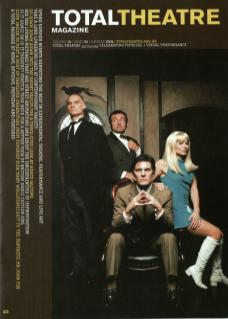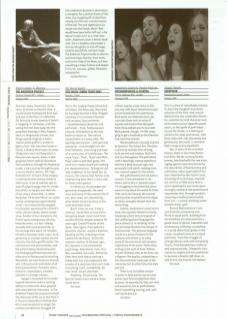This is The Cocktail Party at the end of history, the false play described by Huizinga become a fully-fledged economy. In a universe of pranks and sarcasm, four presences – simultaneously character and performer – trick, fantasise and conjure, with bathos as the only home to return to. The realism around them is a nasty joke. The opening spectacular – with jazz and eyeing up – runs straight into the final moments, exorcising any hope of a conclusion, of satisfaction. The more 'Lucy', ‘Tara', 'Nina' and 'Matthew' seek to end their game, the more it remakes itself with nothing but representations. Talking the old lady neighbour to her death has no closure, the silence that follows only emphasising that there is more talk to come, more games.
It infects us. A pretended end genuinely disappoints. We want more and more of this eternal life of lies, piss-take, art, advertising... what seems most transitory is the most obstinate stain.
But if it has no end, it has a nemesis. Flame Man arrives with a disruptive power I last recall from another Bristol-based company 30 years ago: Crystal Theatre of the Saint. Here again, from behind a domestic illusion, erupts a daemon, banality on fire, a destroyer that cannot kill the beast. Unlike the monster-mother of 30 years ago this daemon is uncontained by psychology. And retires, hurt, to a den, wounded, but sulky – Arthurian. After that, even heavy-petting a teddy bear can only emphasise the crumbs of a structure that can't help consuming itself, wonderfully. No end: more, we are deserted.
Modestly, flirtatiously, The Special Guests have made a major social piece.

